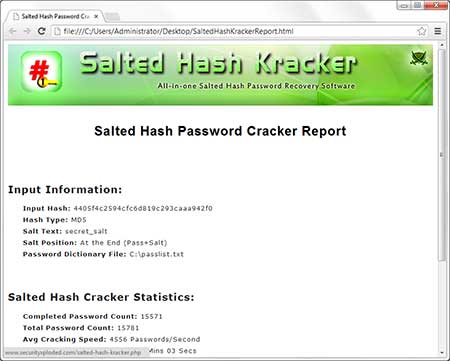

- #SHA512 HASH PASSWORD CREATOR TRIAL#
- #SHA512 HASH PASSWORD CREATOR PC#
- #SHA512 HASH PASSWORD CREATOR CRACK#
There is no work factor that is low enough to be usable but high enough to protect against a dictionary attack. A high work factor will protect against brute force hash cracking, but not against a dictionary attack. "to defend against dictionary attacks, a password hashing scheme must include a work factor to make it as slow as is workable." Both SHA256 and SHA512 are approved NIST hash algorithms. "SHA256 and SHA512 were never meant to be password-hashing" The SHA3 family is probably better, but it isn't widely available either. Bcrypt might be better, but this isn't clear, and bcrypt isn't available on a lot of systems. There's nothing that is clearly better than SHA512 that is likely to be available on your system yet. SHA256 isn't as good as SHA512, but it isn't dreadful either. Switching to SHA512 will make your site slightly more secure. "Switching to SHA512 will hardly make your website more secure." If SHA512 is what you have available 'out of the box', use it (not SHA256), and don't worry about bcrypt or any of the SHA3 family until they become standard for your distribution.Īs an aside, the current top rated answer has a number of claims that are either wrong or misleading. See, for example: changes quickly, so any answer you get might be proved wrong tomorrow, but current state of the art is that while bcrypt is possibly better than SHA512, SHA512 is fine. The reason to change from SHA256 to SHA512 is that SHA256 needs a lot more rounds to be as secure as SHA512, so while it's not insecure, it's less secure.
#SHA512 HASH PASSWORD CREATOR PC#
500000 takes my current pc about 0.45 seconds to calculate, which feels tolerable.Į.g.: password required pam_unix.so sha512 shadow rounds=500000. While the default is 5000 rounds, you can specify more if you wish.
#SHA512 HASH PASSWORD CREATOR CRACK#
One reason commonly given for preferring bcrypt is that bcrypt is tuneable - you can increase the number of rounds (work factor) to increase the time it takes to crack bcrypt hashes.īut SHA256 and SHA512 are also tuneable. SHA512 will be available on your system, or if not, you probably have such an old system that choice of hashing algorithm is the least of your problems. Many people prefer bcrypt to SHA512, but bcrypt is also only available on some operating systems. The list of NIST approved hash functions, at time of writing, is: SHA-1, SHA-224, SHA-256, SHA-384, SHA-512, SHA-512/224, SHA-512/256, and SHA3-224, SHA3-256, SHA3-384, and SHA3-512, SHAKE128 and SHAKE256.ĭepending on what operating system you are running, you probably don't have access to the SHA3 or SHAKE hash functions. SHA256 is still NIST Approved, but it would be good to change to SHA512, or bcrypt, if you can. Examples of suitable keyĭerivation functions include Password-based Key Derivation Function 2 Obtained a password hash file expensive and therefore the cost of a
#SHA512 HASH PASSWORD CREATOR TRIAL#
Purpose is to make each password guessing trial by an attacker who has Salt, and a cost factor as inputs then generate a password hash. Key derivation functions take a password, a Memorized secrets SHALL be salted and hashed using a suitable one-way Other choices, if using a standard is not required, include bcrypt and scrypt.ĮDIT: NIST does not recommend using message digests such as SHA2 or SHA3 directly to hash passwords! Here is what NIST recommends: If Argon2 is not available, the only other standardized password-hashing or key-derivation function is PBKDF2, which is an oldish NIST standard. This family of password hashing functions won the Password Hashing Competition in 2015. In order to defend against dictionary attacks, a password hashing scheme must include a work factor to make it as slow as is workable.Ĭurrently, the best choice is probably Argon2. (Although a message digest could be used a building block for a KDF, such as in PBKDF2 with HMAC-SHA256.)Ī password-hashing function should defend against dictionary attacks and rainbow tables.

SHA256 and SHA512 are message digests, they were never meant to be password-hashing (or key-derivation) functions. You should not write your own password hashing function. Switching to SHA512 will hardly make your website more secure.


 0 kommentar(er)
0 kommentar(er)
